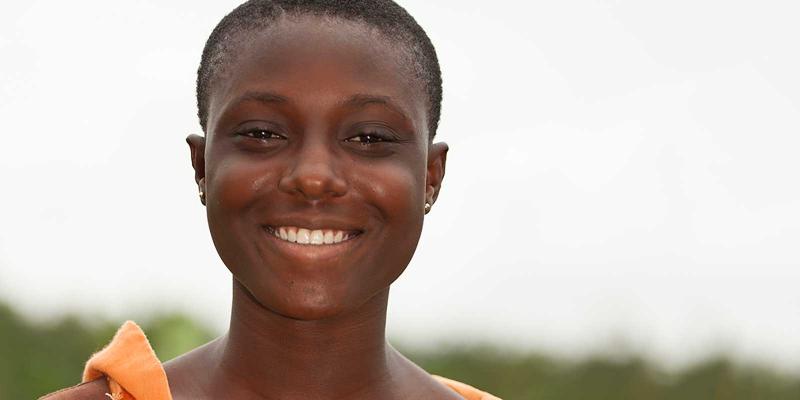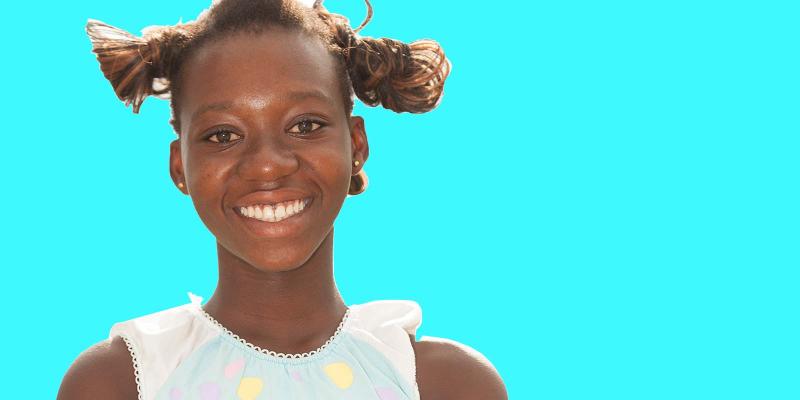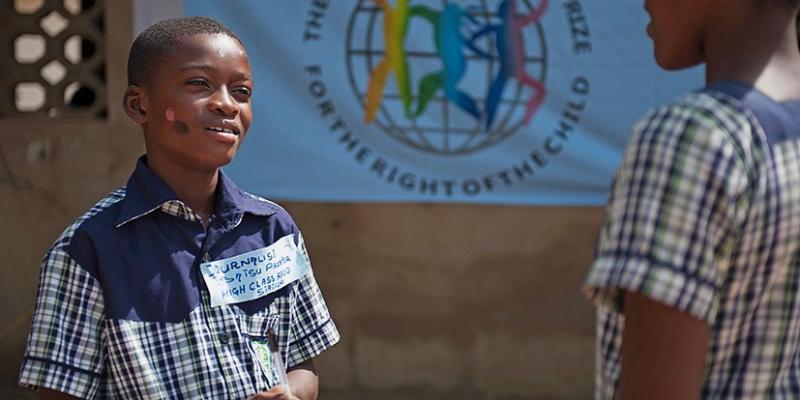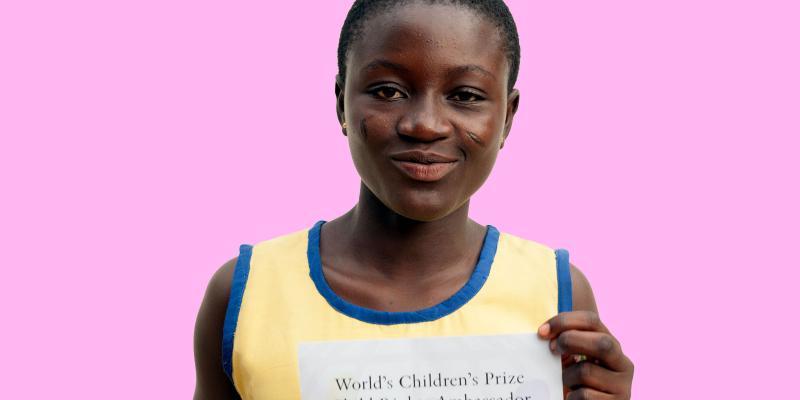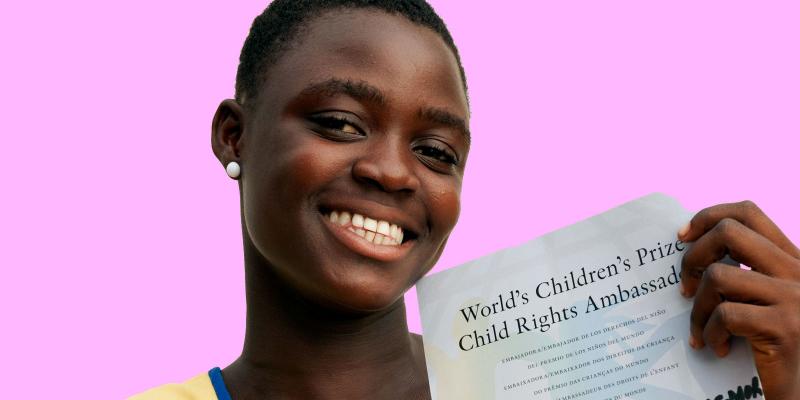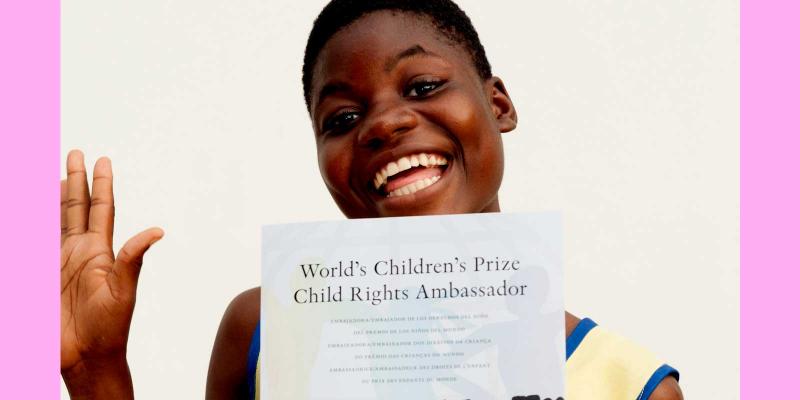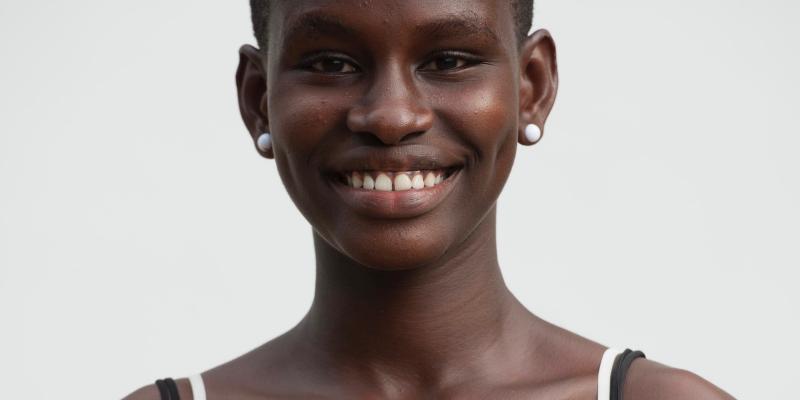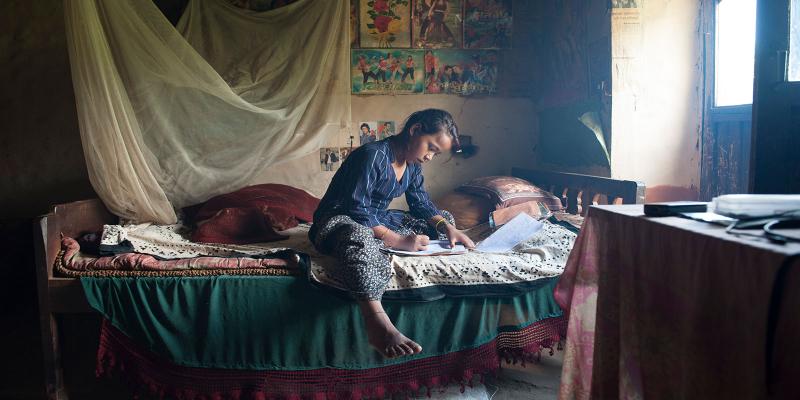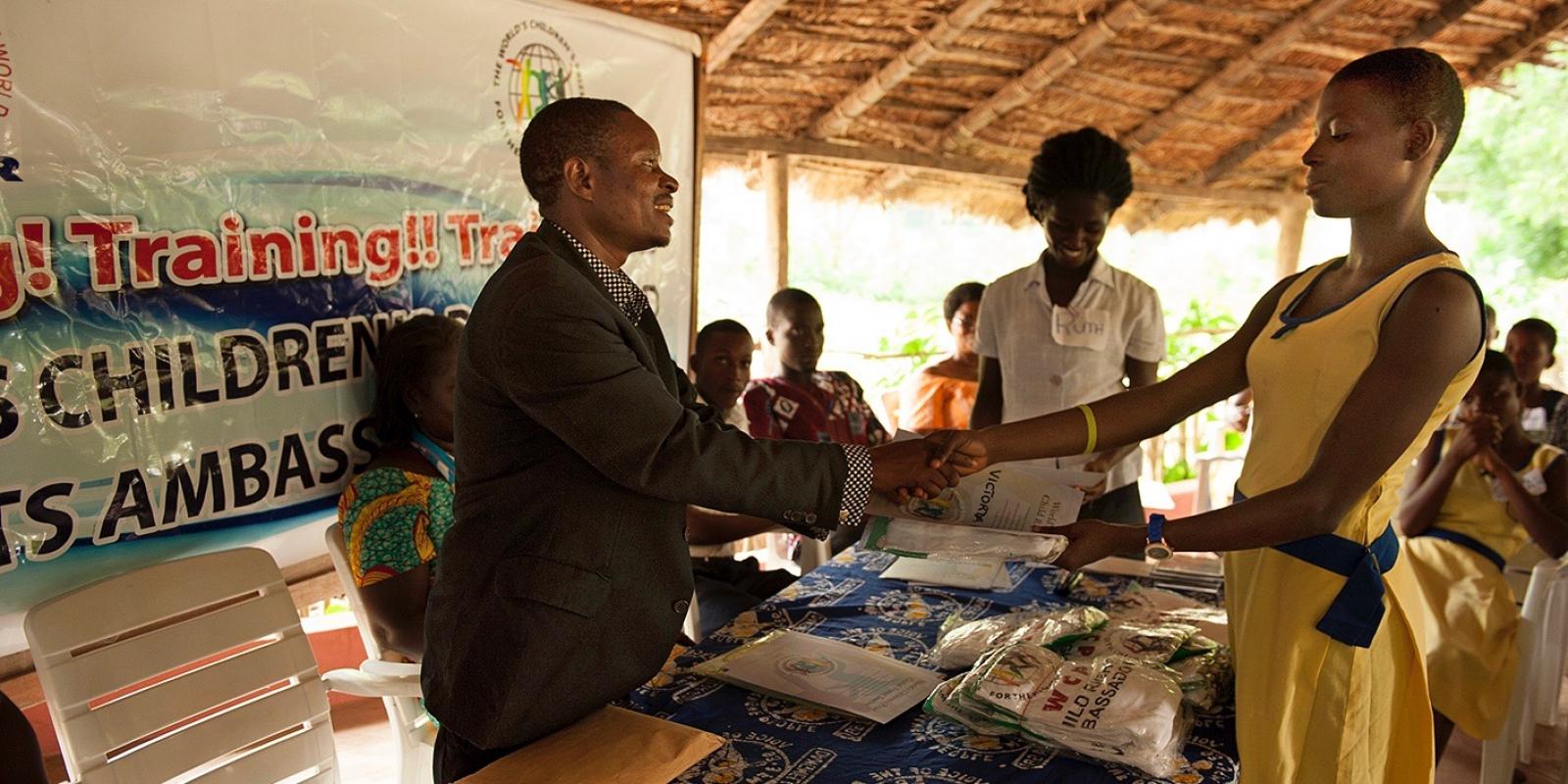
“Ever since I was little I have felt that girls are treated unfairly and not valued as much as boys here. I have always wanted to do something about it, but never really known what. As a WCP Child Rights Ambassador, I finally have a chance to fight for girls’ rights,” says Victory, 17, in the small town of Ada on the Volta River in Ghana.
Victory and her girl friends are excited. One after another they are called up to receive their certificates, showing that they are now Child Rights Ambassadors who fight for girls’ rights. Finally, her turn comes.
“Victory!”
Proudly she accepts her certificate from the head of the area social welfare office.
“Your name is Victory, and I want you to win many victories in changing the lives of children,” he says.
Abused at home
Victory knows that life has to change for many poor children in Ghana. Especially for girls.
“My family is very poor. For as long as I can remember I have had to work,” says Victory.
At the age of just two, she began helping her mother sell freshwater mussels at the market and taking care of the housework along with her sisters. They cooked, cleaned and washed dishes.
“My father has never loved me. But he has beaten me a lot. I have scars all over my body. My siblings too. I’ll never forget one night when I was twelve years old and my father came home late. He woke me and told me to heat up some soup for him. I was still half asleep and a bit clumsy and by accident I spilled a little bit of soup on him. He flew into a rage. He hit me so hard I thought I was going to die. He shouted, ’Don’t you forget that there are children in graveyards! Do you want to keep them company?’”
Became child labourer
When Victory turned fourteen her life got even harder. Her father refused to pay for her education, although he had promised that he would.
“I got a job loading mussel shells onto trucks to help the family survive, and to earn money so I could continue going to school. Every load weighs 30 kilos and you carry it on your head. It’s extremely heavy work. I was much smaller when I started. I often fell ill, with exhaustion causing fever and pain all over my body. Later I had to start another job washing dishes at a restaurant at the weekends and during school holidays. My life is still the same now, and on the days when I’m carrying mussel shells I can’t go to school at all.”
Girls rights
It was when Victory began having to work so hard that she started thinking lots about how girls and boys are not treated equally.
“We girls do everything in the home. The boys play football and play with their friends, and they have plenty of time and energy to do their homework. We girls have to help earn money for the family and make sure everyone survives. We miss loads of time at school. Some families choose not to send their daughters to school at all. They think the only thing we can manage is hard work in the home. They think that’s our role in life.”
For Victory, the worst thing of all is that girls in poor families are very vulnerable.
“Sometimes girls are thrown out of their homes and forced to fend for themselves. When this happens they can easily be exploited. In exchange for food, money or a place to sleep, they end up being lured into the child sex trade. Boys would never be thrown out of their homes in that way. Sometimes our parents are tricked. People come round and say they can offer the daughter in the family a job as a cleaner, shop worker or waitress in another city. The parents are given a small amount of money and they are promised a regular cut of their daughter’s future wages. But they never see any more money. Instead, the girls end up in the child sex trade.”
Becoming an ambassador
Ever since Victory started the job carrying mussel shells, she has wanted to do something to change the fact that girls are treated so much worse than boys.
“I think it’s incredibly stupid and unfair. We are equals! I have always wanted to fight for a better life for us girls, but I never knew how to do it. Then the World’s Children’s Prize asked me and some other girls here in Ada whether we wanted to attend a three-day training course about the rights of the child, to become ambassadors who fight for better lives for girls. ’Finally!’ I said, and I signed up immediately!”
On the course, Victory learned all about the rights of the child, girls having equal rights, the child sex trade, and the World’s Children’s Prize Program.
“It was the first time ever that I had been in a situation where people talked about girls’ rights. It was also the first time that anyone had been interested in hearing our stories.”
Raising awareness
On the final day of the course, Victory and her friends were awarded certificates as proof that they are now Child Rights Ambassadors who fight for girls’ rights.
“I was incredibly proud! From that day on, my ambassador friends and I have been working in different ways to ensure respect and a better future for girls. First and foremost, we educate girls on their rights and help them to start Child Rights Clubs. They in turn train other girls. But it’s just as important for us to train teachers and head teachers on girls’ rights, the child sex trade and how to use The Globe and the World’s Children’s Prize program in the classroom.
We talk a lot about how girls and boys are equal human beings and should be treated as such. About how it’s obvious that boys and girls should share all work equally, so that we girls are not forced to miss school and so that we have more time and energy to do our homework properly.
If we continue informing people and raising awareness, I really believe that girls’ rights will be respected in the future!”
Certificate
“On the last day of the training, I got a certificate that shows that I am a qualified WCP ambassador for girls’ rights. I was so proud! It felt important! I have put it up on my wall.”
Ambassador training
“I learned loads about the rights of the child, especially about girls’ rights and the child sex trade. I felt like I was getting stronger together with the other girls.”
Lives: In Ada, on the Volta River.
Loves: Dancing.
Hates: When children are treated badly.
Best thing that’s happened: Getting to start school.
Worst thing that’s happened: Being abused by my father.
Wants to be: A TV reporter.
Dream: To start a nursery for poor children where they get food and love.
“First I sweep the yard, collect water from the river, wash the dishes and throw away the garbage. Then my sister and I collect mussels from the river. After that I get washed and eat breakfast before going to school, which starts at eight o’clock.”
“On Tuesdays and Fridays my sisters and I take it in turns to help our mother to sell mussels at the market. On my market days I don’t usually make it to school at all.”
“Two days a week I load mussel shells from the river onto trucks. The drivers let us know the day before, and on those days I don’t make it to school, and neither do lots of the other girls here. Every load that you carry on your head weighs around 30 kilos, and I get 10 cedis (4.5 US dollars) for a day’s work.”
“As soon as I have time to spare I try to read my copy of The Globe. I think it’s really good. It teaches me loads about my rights and about what life is like for children all over the world. I often identify with the stories. For example, in the stories from Nepal, girls are the ones who have to work hard, just like me. That makes me sad because it’s unfair! The stories in The Globe convince me to keep fighting for girls’ rights.”
Global Vote necklace
The braided greenish-yellow necklaces that the ambassadors wear are called Kpa Na Lo.
“Election campaigners from the different parties often wear these in the lead up to political elections. The necklaces are dyed to match the colours of the political parties. As Child Rights Ambassadors we chose yellow and green for our Global Vote, because we think those colours look good,” explains Victory.
Victory shows us five outfits from her wardrobe
All five girls are Victory, and from left to right she is dressed as: A Child Rights Ambassador, a market stall holder, a school student, a mussel carrier, and a churchgoer in her Sunday best.
“My school uniform is definitely my favourite outfit. It is proof that I go to school, and I think I look good in it,” says Victory.
Educating teachers and head teachers
“I also teach teachers and head teachers about the rights of the child, girls’ rights and the child sex trade. The idea is that what we teach them, they then pass on to their students when participating in the World’s Children’s Prize Program. Under normal circumstances, children would never get to teach adults here. Never! But they actually listen to us and take us seriously.” Teachers are being trained here at Presby Junior High School.
Child Rights Radio
“I often listen to a news program for children called Kids News, on Radio Ada. For ages I have wanted to talk about girls’ rights on the program, but I have never dared try. But since the ambassador training I have had more courage and confidence, so on Saturday I plucked up the courage to do it for the first time. I talked about girls’ rights, the child sex trade, and the World’s Children’s Prize. I was so nervous, but I felt that I had important things to say, so I did it anyway. Now I can’t wait for the next broadcast!”
Child Rights Clubs
“We ambassadors help girls to start Child Rights Clubs. We teach them about the rights of the child, and girls’ rights in particular, and about the child sex trade and the WCP Program. The clubs are really important, because that’s where the girls learn about their rights, so that they know exactly what to fight for. The clubs raise awareness among girls at other schools too. Part of the idea of
the clubs is also to try to help any member who is struggling, for example by crocheting tablecloths and baby clothes to sell at the market. Any money raised will belong to the club, but can be given to whoever needs help at that time.” A girls’ club is being started here at Methodist Basic School.
Latest news!
The radio station where Victory talks about girls’ rights has a gong as its symbol. In the olden days, people known as ‘town criers’ used to walk from village to village in Ghana, telling people the latest news. The town criers would strike a gong to gather as many people as possible to hear the news. These days in Victory’s area, the latest news and information about girls’ rights, the child sex trade and the World’s Children’s Prize is all communicated by radio.
Related stories
Långgatan 13, 647 30, Mariefred, Sweden
Phone: +46-159-129 00 • info@worldschildrensprize.org
© 2020 World’s Children’s Prize Foundation. All rights reserved. WORLD'S CHILDREN'S PRIZE®, the Foundation's logo, WORLD'S CHILDREN'S PRIZE FOR THE RIGHTS OF THE CHILD®, WORLD'S CHILDREN'S PARLIAMENT®, WORLD'S CHILDREN'S OMBUDSMAN®, WORLD'S CHILDREN'S PRESS CONFERENCE® and YOU ME EQUAL RIGHTS are service marks of the Foundation.



